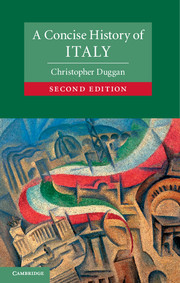Book contents
- Frontmatter
- Contents
- List of Illustrations
- List of Maps
- List of Tables
- Preface
- Chronology
- Introduction
- 1 The geographical determinants of disunity
- 2 Disunity and conflict: from the Romans to the Renaissance, 400–1494
- 3 Stagnation and reform, 1494–1789
- 4 The emergence of the national question, 1789–1849
- 5 Italy united
- 6 The liberal state and the social question, 1870–1900
- 7 Giolitti, the First World War, and the rise of Fascism
- 8 Fascism
- 9 The Republic
- Bibliographical essay
- Index
6 - The liberal state and the social question, 1870–1900
Published online by Cambridge University Press: 05 June 2014
- Frontmatter
- Contents
- List of Illustrations
- List of Maps
- List of Tables
- Preface
- Chronology
- Introduction
- 1 The geographical determinants of disunity
- 2 Disunity and conflict: from the Romans to the Renaissance, 400–1494
- 3 Stagnation and reform, 1494–1789
- 4 The emergence of the national question, 1789–1849
- 5 Italy united
- 6 The liberal state and the social question, 1870–1900
- 7 Giolitti, the First World War, and the rise of Fascism
- 8 Fascism
- 9 The Republic
- Bibliographical essay
- Index
Summary
The Taking of Rome
Just as Austria’s defeat by Prussia in 1866 had brought Italy the Veneto, so France’s defeat by Prussia in 1870 led to the capture of Rome. Throughout much of the 1860s the Holy City had been defended by a garrison of French soldiers. When this was withdrawn in the summer of 1870 to fight Prussia, and Napoleon III was defeated and forced to abdicate, there was little to stop the Italian government seizing the historic capital. On 20 September, less than three weeks after the Battle of Sedan, Italian troops blew a hole in the Leonine walls at Porta Pia and marched into the city. Pius IX was left with the small enclave of the Vatican. A law was passed in May 1871 that guaranteed the safety of the pope, provided him with an annual grant, and gave him the full dignities and privileges of a sovereign; but Pius IX rejected it out of hand. The rift between the liberal state and the Church was now broader and deeper than ever.
The acquisition of Rome had long been the supreme ambition of most Italian patriots. For Mazzini’s followers in particular, the city was always much more than just a piece of territory. It was a symbol of moral regeneration, pregnant with the idea of mission and responsibility; and just as the Rome of the Caesars and the Rome of the popes had each brought the world a new civilisation, so the ‘Third Rome’, that of ‘the people’, would arise and convey to the oppressed the gospel of liberation and peace. Even such a rational moderate as Quintino Sella could not escape the spell of Rome: he longed, he said, to underline the universal significance of destroying the pope’s temporal power by making the city into a great centre for science. However, not everyone was smitten. Massimo d’Azeglio and Stefano Jacini objected to Rome becoming the capital of Italy precisely because of its historical associations, which, they felt, would weigh dangerously on the country’s rulers.
- Type
- Chapter
- Information
- A Concise History of Italy , pp. 144 - 172Publisher: Cambridge University PressPrint publication year: 2013



